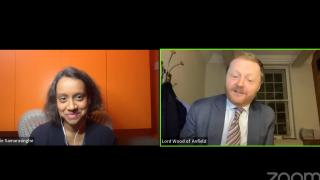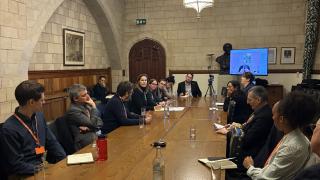
On 10 January UNA-UK held its first event of the year, sharing perspectives on the UN and the UK’s role in 2022 and beyond, on the 76th anniversary of the UN General Assembly’s first meetings in London.
The event was also an opportunity to say farewell to UNA-UK’s CEO, Natalie Samarasinghe, after 15 years of service - as well as to welcome our incoming Chair Baroness Joyce Anelay of St Johns DBE, who will be joining the Association in June.
Baroness Anelay was joined by former British diplomat Sir Peter Marshall for an interactive Q&A session on the UK’s relationship with the UN, moderated by Rianna Nayee. This was followed by a panel discussion with Natalie Samarasinghe and UNA-UK Patron and former UN Deputy-Secretary General Lord Malloch-Brown on present and future challenges for the UN, moderated by Dalí ten Hove.
Exploring how the UN has evolved over the last 76 years, Sir Peter Marshall said:
The experiment launched in 1945 has been a colossal success. In 1945 there were 51 UN member states, today there are 193. There are now 3 times the number of people today than there were then, and their average lot is infinitely better.
Baroness Anelay examined the importance of the UN and the UK’s role:
What is so special about the UN is that every country has a voice. The credibility the UN gets as a result is that it acts as a linchpin for our rules-based international order, and that is key to UK foreign policy. It is in our interest that this is maintained.
People in the UK should care about the UN because it’s about their future. The UN has shown that it can create future stability; amidst the most appalling challenges it can find a way through. How can people get involved? By joining UNA-UK!
Reflecting on the UN and UNA-UK’s work, Natalie Samarasinghe said:
For international cooperation, for the UN to work, things need to happen at different levels - movements pushing for progress, national action, regional agreement can all feed into the global level to create something universal, to set a global framework or response, and then it needs to filter down again to ensure accountability, that it is more than the sum of its parts.
That’s why UNA has focused so much on the issue of inclusion; that’s why I’ve been that person in the room banging on about the UN and about civil society, public engagement, trust because these things never really seem to matter until you need them the most.
Lord Malloch-Brown noted the UN’s capacity to grow:
The UN is ultimately a porous political system, which holds a mirror up to the world it represents - and reflects that world for better or worse. The modern diversity of who the UN considers its stakeholders has moved forward, and that’s very exciting. It’s problematic as to how to help such a range of people on such a range of issues, but here’s a UN trying its best to keep up with changes in the world.
The event was closed by UNA-UK’s Chair Lord Stewart Wood, who highlighted Natalie’s work over the last two decades.
We’re going to miss Natalie hugely as the CEO of UNA-UK. Not just because she leaves the organisation transformed from what it was decades ago, and not just because of her extraordinary skills.
We’re going to miss Natalie because she has shown how to be a leader of an organisation in a way that inspires, that is based on values and principle, and also treats people inside and outside the organisation with enormous respect.
Watch the event in full below:






